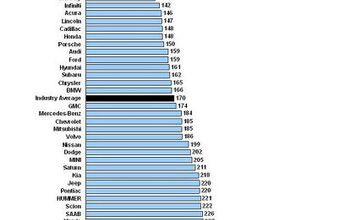Buick and Lexus Predictably Top J.D. Power's Dependability Survey

J.D. Power and Associates continued their now routine praise of Buick, Lexus, and Porsche by giving the brands top honors in the company’s latest annual dependability study.
The survey, which assesses the number of reported problems per 100 vehicles during the first three years of vehicle ownership, resulted in Lexus achieving top marks with only 99 claimed issues. Toyota’s premium brand (which has won seven years running) was followed closely by Porsche with 100 reported problems, whereas Buick was the “mass market” brand with the fewest faults at 116.
Issues pertaining to audio, communications, navigation, or entertainment systems continued to yield the highest number of complaints from consumers in 2018. However, the gap between luxury and mainstream brands appears to be closing, as most of last year’s top performers lost a little ground to mid-level mainstream competitors. Infiniti saw the most improvement overall, coming from the bottom of the pack in 2017 to take 4th overall this year. It was followed by Kia, with 122 problems per 100 vehicles — proving that premium levels of quality are not exclusive to premium brands.
Speaking of which, suspiciously absent from J.D. Power’s listings was Tesla Motors. The study made no mention of the electric brand whatsoever. When questioned, Power explained that the automaker had not provided access to owner information, adding that a sufficiently large sample was unavailable for Tesla models to be included in the study.
Chevrolet, Hyundai, BMW, Toyota, Lincoln, Nissan, Honda, and Audi all managed to stay above the industry average of 142 problems per 100 vehicles. Mazda and Mercedes-Benz fell just short with 145 and 147 issues, respectively.
No longer positioned exclusively at the bottom of J.D. Power’s dependability list, Fiat Chrysler brands were spread throughout the bottom third for 2018. Dodge fared the best with 166 reported problems within the first three years of ownership, while Chrysler scored the worst with a lackluster 211 — giving it the dubious honor of being the worst-performing brand in the survey.
Land Rover garnered the second-most reported incidents with 204, followed by Fiat and Jeep. Admittedly, FCA still didn’t do particularly well in 2018. But its overall performance did show notable improvements against last year’s standings.
A complete breakdown of all North American brands is available at J.D. Power’s website. Even a cursory examination reveals marked improvement in overall powertrain dependability — at least within the first three years of ownership — and an industry that’s still coming to grips with how to help customers understand in-car technologies. Either that, or new tech has become a quagmire for service centers.
“For the most part, automotive manufacturers continue to meet consumers’ vehicle dependability expectations,” explained Dave Sargent, vice president of global automotive at J.D. Power. “A 9-percent improvement is extremely impressive, and vehicle dependability is, without question, at its best level ever.”
[Image: Lexus]

A staunch consumer advocate tracking industry trends and regulation. Before joining TTAC, Matt spent a decade working for marketing and research firms based in NYC. Clients included several of the world’s largest automakers, global tire brands, and aftermarket part suppliers. Dissatisfied with the corporate world and resentful of having to wear suits everyday, he pivoted to writing about cars. Since then, that man has become an ardent supporter of the right-to-repair movement, been interviewed on the auto industry by national radio broadcasts, driven more rental cars than anyone ever should, participated in amateur rallying events, and received the requisite minimum training as sanctioned by the SCCA. Handy with a wrench, Matt grew up surrounded by Detroit auto workers and managed to get a pizza delivery job before he was legally eligible. He later found himself driving box trucks through Manhattan, guaranteeing future sympathy for actual truckers. He continues to conduct research pertaining to the automotive sector as an independent contractor and has since moved back to his native Michigan, closer to where the cars are born. A contrarian, Matt claims to prefer understeer — stating that front and all-wheel drive vehicles cater best to his driving style.
More by Matt Posky
Latest Car Reviews
Read moreLatest Product Reviews
Read moreRecent Comments
- Urlik You missed the point. The Feds haven’t changed child labor laws so it is still illegal under Federal law. No state has changed their law so that it goes against a Federal child labor hazardous order like working in a slaughter house either.
- Plaincraig 1975 Mercury Cougar with the 460 four barrel. My dad bought it new and removed all the pollution control stuff and did a lot of upgrades to the engine (450hp). I got to use it from 1986 to 1991 when I got my Eclipse GSX. The payments and insurance for a 3000GT were going to be too much. No tickets no accidents so far in my many years and miles.My sister learned on a 76 LTD with the 350 two barrel then a Ford Escort but she has tickets (speeding but she has contacts so they get dismissed or fine and no points) and accidents (none her fault)
- Namesakeone If I were the parent of a teenage daughter, I would want her in an H1 Hummer. It would be big enough to protect her in a crash, too big for her to afford the fuel (and thus keep her home), big enough to intimidate her in a parallel-parking situation (and thus keep her home), and the transmission tunnel would prevent backseat sex.If I were the parent of a teenage son, I would want him to have, for his first wheeled transportation...a ride-on lawnmower. For obvious reasons.
- ToolGuy If I were a teen under the tutelage of one of the B&B, I think it would make perfect sense to jump straight into one of those "forever cars"... see then I could drive it forever and not have to worry about ever replacing it. This plan seems flawless, doesn't it?
- Rover Sig A short cab pickup truck, F150 or C/K-1500 or Ram, preferably a 6 cyl. These have no room for more than one or two passengers (USAA stats show biggest factor in teenage accidents is a vehicle full of kids) and no back seat (common sense tells you what back seats are used for). In a full-size pickup truck, the inevitable teenage accident is more survivable. Second choice would be an old full-size car, but these have all but disappeared from the used car lots. The "cute small car" is a death trap.


































Comments
Join the conversation
JD Power - I'd like to see how their "ratings" stack ag/ their client billings. I'd rate JD Power near the bottom of "research" firms. " J.D. Power obtains the majority of its revenue from corporations that seek the data collected from J.D. Power surveys for internal use.[1] Companies which have used J.D. Power surveys range from automotive, cellphone, and computer manufacturers to home builders and utility companies. To be able to use the J.D. Power logo and to quote the survey results in advertising, companies must pay a licensing fee to J.D. Power. These advertisement licensing fees form a small part of J.D. Power's revenues but a substantial portion of earnings.[1]" https://en.wikipedia.org/wiki/J.D._Power_and_Associates
The Buicks do have higher-quality interior materials, at least that’s what I took away from the auto show last week. In particular, the cheap membrane steering-wheel controls in the Chevvies are replaced by actual buttons in the Buicks. (There was a Regal liftback on the floor, but I couldn’t find the hatch release switch! Pawed around the door, in the glovebox, and center console looking for it.) Is the Regal GS liftback only available in red over black? (The one with a V6?) I do like the adoption of LED interior lighting across the GM lineup — classy! Didn’t get to see Caddys or HyundKias, as that dealer group didn’t show anything. (No Rincolns either.)